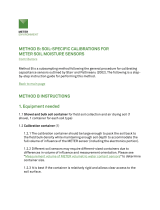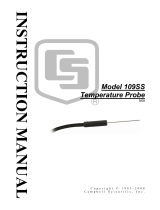Page is loading ...

INSTRUCTION MANUAL
HFT3 Soil Heat Flux Plate
Revision: 10/03
Copyright (c) 1987-2003
Campbell Scientific, Inc.

Warranty and Assistance
The HFT3 SOIL HEAT FLUX PLATE is warranted by CAMPBELL
SCIENTIFIC, INC. to be free from defects in materials and workmanship under
normal use and service for twelve (12) months from date of shipment unless
specified otherwise. Batteries have no warranty. CAMPBELL SCIENTIFIC,
INC.'s obligation under this warranty is limited to repairing or replacing (at
CAMPBELL SCIENTIFIC, INC.'s option) defective products. The customer
shall assume all costs of removing, reinstalling, and shipping defective products
to CAMPBELL SCIENTIFIC, INC. CAMPBELL SCIENTIFIC, INC. will
return such products by surface carrier prepaid. This warranty shall not apply
to any CAMPBELL SCIENTIFIC, INC. products which have been subjected to
modification, misuse, neglect, accidents of nature, or shipping damage. This
warranty is in lieu of all other warranties, expressed or implied, including
warranties of merchantability or fitness for a particular purpose. CAMPBELL
SCIENTIFIC, INC. is not liable for special, indirect, incidental, or
consequential damages.
Products may not be returned without prior authorization. The following
contact information is for US and International customers residing in countries
served by Campbell Scientific, Inc. directly. Affiliate companies handle repairs
for customers within their territories. Please visit www.campbellsci.com to
determine which Campbell Scientific company serves your country. To obtain
a Returned Materials Authorization (RMA), contact CAMPBELL
SCIENTIFIC, INC., phone (435) 753-2342. After an applications engineer
determines the nature of the problem, an RMA number will be issued. Please
write this number clearly on the outside of the shipping container.
CAMPBELL SCIENTIFIC's shipping address is:
CAMPBELL SCIENTIFIC, INC.
RMA#_____
815 West 1800 North
Logan, Utah 84321-1784
CAMPBELL SCIENTIFIC, INC. does not accept collect calls.

i
HFT3 Table of Contents
PDF viewers note: These page numbers refer to the printed version of this document. Use
the Adobe Acrobat® bookmarks tab for links to specific sections.
1. General Description....................................................1
2. Specifications .............................................................1
3. Installation...................................................................2
4. Wiring ..........................................................................3
5. Example Programs .....................................................4
6. Soil Heat Flux and Storage.........................................5
7. Maintenance................................................................6
8. References ..................................................................6
Figures
1. Placement of Heat Flux Plates....................................................................2
2. HFT3 Plate to Datalogger Connections ......................................................3
Tables
1. Datalogger Connections for a Single-Ended Measurement.........................3
2. Datalogger Connections for a Differential Measurement............................3
3. Wiring for Example 1 .................................................................................4
4. Wiring for Example 2 .................................................................................4

This is a blank page.

1
Model HFT3 Soil Heat Flux Plate
1. General Description
The HFT3 Soil Heat Flux plate uses a thermopile to measure temperature
gradients across the plate. Each plate is individually calibrated to output flux.
In order to measure soil heat flux at the surface, several HFT3s are used to
measure the soil heat flux at a depth of eight cm. A TCAV Averaging Soil
Thermocouple is used to measure the temporal change in temperature of the
soil layer above the HFT3. Finally, a CS615 Water Content Reflectometer is
used to measure the soil water content. The temporal change in soil
temperature and soil water content are used to compute the soil storage term.
The -L option on the model HFT3 Soil Heat Flux plate (HFT3-L) indicates that
the cable length is user specified. This manual refers to the sensor as the
HFT3.
2. Specifications
Operating Temperature: -40°C to +55°C
Storage Temperature: -40°C to +55°C
Plate Thickness: 3.91 mm (0.154 in.)
Plate Diameter: 38.2 mm (1.5 in.)
Sensor: thermopile
Measurement Range: ±100 W m
-2
Signal Range: ±2.4 mV for the above range
Accuracy: better than ±5% of reading
Thermal Conductivity: 1.22 W m
-1
K
-1

Model HFT3 Soil Heat Flux Plate
2
2 cm
6 cm
8 cm
Ground Surface
Up to 1 m
2.5 cm
FIGURE 1. Placement of Heat Flux Plates
3. Installation
The HFT3 Soil Heat Flux plates, the TCAV Averaging Soil Temperature
probes, and the CS615 Water Content Reflectometer are installed as shown in
Figure 1.
The location of the heat flux plates and thermocouples should be chosen to be
representative of the area under study. If the ground cover is extremely varied,
it may be necessary to have additional sensors to provide a valid average of soil
heat flux.
Use a small shovel to make a vertical slice in the soil. Excavate the soil to one
side of the slice. Keep this soil intact so that is can be replaced with minimal
disruption.
The sensors are installed in the undisturbed face of the hole. Measure the
sensor depths from the top of the hole. With a small knife, make a horizontal
cut eight cm below the surface into the undisturbed face of the hole. Insert the
heat flux plate into the horizontal cut.
Install the HFT3 in the soil such that the side with the white dot is
facing the sky.
In order for the HFT3 to make quality soil heat flux
measurements, the plate must be in full contact with the
soil.
NOTE
CAUTION
Partial emplacement of the HFT3 and the TCAV
sensors is shown for illustration purposes. All
sensors must be completely inserted into the soil face
before the hole is backfilled.

Model HFT3 Soil Heat Flux Plate
3
Never run the sensors leads directly to the surface. Rather, bury the sensor
leads a short distance back from the hole to minimize thermal conduction on
the lead wire. Replace the excavated soil back into it original position after all
the sensors are installed.
FIGURE 2. HFT3 Plate to Datalogger Connections
TABLE 1. Datalogger Connections for a Single-Ended Measurement
Description Color CR10(X), CR510 CR23X, 21X, CR7
Signal Black Single-Ended Input Single-Ended Input
Signal Reference White AG
Shield Clear G
TABLE 2. Datalogger Connections for a Differential Measurement
Description Color CR10(X), CR510 CR23X, 21X, CR7
Signal Black Differential Input (H) Differential Input (H)
Signal Reference White Differential Input (L) Differential Input (L)
Shield Clear G
4. Wiring
Connections to Campbell Scientific dataloggers are given in Tables 1 and 2.
The output of the HFT3 can be measured using a single-ended analog
measurement (Instruction 1) or a differential analog measurement (Instruction
2).
Signal Black
Signal Reference White
Shield Clear
White Dot
on Top

Model HFT3 Soil Heat Flux Plate
4
The wiring convention is that the black wire is positive with respect to the other
insulated wire, when energy is flowing through the transducer from the side
with white dot to the side without the white dot.
5. Example Programs
This section is for users who write their own dataloger programs. A datalogger
program to measure the sensor can be created using Campbell Scientific’s Short
Cut Program Builder software. You do not need to read this section if you use
Short Cut.
The HFT3 has a nominal calibration of 42 W m
-2
mV
-1
. Each sensor is
accompanied with a calibration certificate. Each sensor has a unique
calibration label on it. The label is located on the pigtail end of the sensor
leads.
TABLE 3. Wiring for Example 1
Description Color CR10(X)
Signal Black SE 5 (3H)
Signal Reference White AG
Shield Clear G
Example 1 Sample CR10(X) Program using a Single-Ended Measurement Instruction
01: Volt (SE) (P1)
1: 1 Reps
2: 2 7.5 mV Slow Range ;CR510 (7.5 mV);CR23X (10 mV); 21X, CR7 (5 mV)
3: 5 SE Channel ;Black wire (SE 5), White wire (AG)
4: 1 Loc [ HFT3 ]
5: 1 Mult ;Enter Calibration
6: 0 Offset
TABLE 4. Wiring for Example 2
Description Color CR23X
Signal Black 9H
Signal Reference White 9L
Shield Clear

Model HFT3 Soil Heat Flux Plate
5
Example 2 Sample CR23X Program using a Differential Measurement Instruction
;Measure the HFT3 Soil Heat Flux plate.
;
01: Volt (Diff) (P2)
1: 1 Reps
2: 21 10 mV, 60 Hz Reject, Slow Range ;CR510, CR10(X) (7.5 mV); 21X, CR7 (5 mV)
3: 9 DIFF Channel ;Black wire (9H); White wire (9L)
4: 1 Loc [ HFT3 ]
5: 1 Mult ;Enter Calibration
6: 0 Offset
6. Soil Heat Flux and Storage
The soil heat flux at the surface is calculated by adding the measured flux at a
fixed depth, d, to the energy stored in the layer above the heat flux plates. The
specific heat of the soil and the change in soil temperature, ∆T
s
, over the output
interval, t, are required to calculate the stored energy.
The heat capacity of the soil is calculated by adding the specific heat of the dry
soil to that of the soil water. The values used for specific heat of dry soil and
water are on a mass basis. The heat capacity of the moist soil is given by:
(
)
CCCC C
sbdmw bdvww
=+ =+ρθ ρθρ (1)
θ
ρ
ρ
θ
m
w
b
v
= (2)
where C
S
is the heat capacity of moist soil, ρ
b
is bulk density, ρ
w
is the density
of water, C
d
is the heat capacity of a dry mineral soil, θ
m
is soil water content
on a mass basis,
θ
v
is soil water content on a volume basis, and C
w
is the heat
capacity of water.
This calculation requires site specific inputs for bulk density, mass basis soil
water content or volume basis soil water content, and the specific heat of the
dry soil. Bulk density and mass basis soil water content can be found by
sampling (Klute, 1986). The volumetric soil water content is measured by the
CS615 water content reflectometer. A value of 840 J kg
-1
K
-1
for the heat
capacity of dry soil is a reasonable value for most mineral soils (Hanks and
Ashcroft, 1980).
The storage term is then given by Eq. (3) and the soil heat flux at the surface is
given by Eq. (4).
S
TCd
t
ss
=
∆
(3)
GG S
sfc cm
=+
8
(4)

Model HFT3 Soil Heat Flux Plate
6
7. Maintenance
The HFT3 requires minimal maintenance. Check the sensor leads monthly for
rodent damage.
Recalibrate the HFT3 every two years of continuous use. Obtain an RMA
number before returning the HFT3 to Campbell Scientific for calibration.
8. References
Hanks, R. J., and G. L. Ashcroft, 1980: Applied Soil Physics: Soil Water and
Temperature Application. Springer-Verlag, 159 pp.
Klute, A., 1986: Method of Soil Analysis. No. 9, Part 1, Sections 13 and 21,
American Society of Agronomy, Inc., Soil Science Society of America,
Inc.

This is a blank page.

Campbell Scientific Companies
Campbell Scientific, Inc. (CSI)
815 West 1800 North
Logan, Utah 84321
UNITED STATES
www.campbellsci.com
info@campbellsci.com
Campbell Scientific Africa Pty. Ltd. (CSAf)
PO Box 2450
Somerset West 7129
SOUTH AFRICA
www.csafrica.co.za
Campbell Scientific Australia Pty. Ltd. (CSA)
PO Box 444
Thuringowa Central
QLD 4812 AUSTRALIA
www.campbellsci.com.au
Campbell Scientific do Brazil Ltda. (CSB)
Rua Luisa Crapsi Orsi, 15 Butantã
CEP: 005543-000 São Paulo SP BRAZIL
www.campbellsci.com.br
suporte@campbellsci.com.br
Campbell Scientific Canada Corp. (CSC)
11564 - 149th Street NW
Edmonton, Alberta T5M 1W7
CANADA
www.campbellsci.ca
Campbell Scientific Ltd. (CSL)
Campbell Park
80 Hathern Road
Shepshed, Loughborough LE12 9GX
UNITED KINGDOM
www.campbellsci.co.uk
Campbell Scientific Ltd. (France)
Miniparc du Verger - Bat. H
1, rue de Terre Neuve - Les Ulis
91967 COURTABOEUF CEDEX
FRANCE
www.campbellsci.fr
campbell.scientific@wanadoo.fr
Campbell Scientific Spain, S. L.
Psg. Font 14, local 8
08013 Barcelona
SPAIN
www.campbellsci.es
info@campbellsci.es
Please visit www.campbellsci.com to obtain contact information for your local US or International representative.
/


